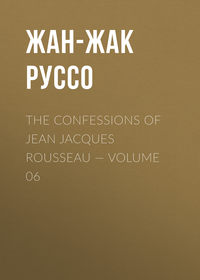 полная версия
полная версияThe Confessions of Jean Jacques Rousseau — Complete
As I approached Lausanne, I thought of my distress, and the means of extricating myself, without appearing in want to my step-mother. I compared myself, in this walking pilgrimage, to my friend Venture, on his arrival at Annecy, and was so warmed with the idea, that without recollecting that I had neither his gentility nor his talents, I determined to act the part of little Venture at Lausanne, to teach music, which I did not understand, and say I came from Paris, where I had never been.
In consequence of this noble project (as there was no company where I could introduce myself without expense, and not choosing to venture among professional people), I inquired for some little inn, where I could lodge cheap, and was directed to one named Perrotet, who took in boarders. This Perrotet, who was one of the best men in the world, received me very kindly, and after having heard my feigned story and profession, promised to speak of me, and endeavored to procure me scholars, saying he should not expect any money till I had earned it. His price for board, though moderate in itself, was a great deal to me; he advised me, therefore, to begin with half board, which consisted of good soup only for dinner, but a plentiful supper at night. I closed with this proposition, and the poor Perrotet trusted me with great cheerfulness, sparing, meantime, no trouble to be useful to me.
Having found so many good people in my youth, why do I find so few in my age? Is their race extinct? No; but I do not seek them in the same situation I did formerly, among the commonality, where violent passions predominate only at intervals, and where nature speaks her genuine sentiments. In more elevated stations they are entirely smothered, and under the mask of sentiment, only interest or vanity is heard.
Having written to my father from Lausanne, he sent my packet and some excellent advice, of which I should have profited better. I have already observed that I have moments of inconceivable delirium, in which I am entirely out of myself. The adventure I am about to relate is an instance of this: to comprehend how completely my brain was turned, and to what degree I had ‘Venturised’ (if I may be allowed the expression), the many extravagances I ran into at the same time should be considered. Behold me, then, a singing master, without knowing how to note a common song; for if the five or six months passed with Le Maitre had improved me, they could not be supposed sufficient to qualify me for such an undertaking; besides, being taught by a master was enough (as I have before observed) to make me learn ill. Being a Parisian from Geneva, and a Catholic in a Protestant country, I thought I should change my name with my religion and country, still approaching as near as possible to the great model I had in view. He called himself Venture de Villeneuve. I changed, by anagram, the name Rousseau into that of Vaussore, calling myself Monsieur Vaussore de Villeneuve. Venture was a good composer, though he had not said so; without knowing anything of the art, I boasted of my skill to every one. This was not all: being presented to Monsieur de Freytorens, professor of law, who loved music, and who gave concerts at his house, nothing would do but I must give him a proof of my talents, and accordingly I set about composing a piece for his concerts, as boldly as if I had really understood the science. I had the constancy to labor a fortnight at this curious business, to copy it fair, write out the different parts, and distribute them with as much assurance as if they had been masterpieces of harmony; in short (what will hardly be believed, though strictly true), I tacked a very pretty minuet to the end of it, that was commonly played about the streets, and which many may remember from these words, so well known at that time:
Quel caprice! Quelle injustice! Quoi! ta Clarice Trahirait tes feux! &c.Venture had taught me this air with the bass, set to other words, by the help of which I had retained it: thus at the end of my composition, I put this minuet and bass, suppressing the words, and uttering it for my own as confidently as if I had been speaking to the inhabitants of the moon. They assembled to perform my piece; I explain to each the movement, taste of execution, and references to his part—I was fully occupied. They were five or six minutes preparing, which were for me so many ages: at length, everything is adjusted, myself in a conspicuous situation, a fine roll of paper in my hand, gravely preparing to beat time. I gave four or five strokes with my paper, attending with “take care!” they begin—No, never since French operas existed was there such a confused discord! The minuet, however, presently put all the company in good humor; hardly was it begun, before I heard bursts of laughter from all parts, every one congratulated me on my pretty taste for music, declaring this minuet would make me spoken of, and that I merited the loudest praise. It is not necessary to describe my uneasiness, or to own how much I deserved it.
Next day, one of the musicians, named Lutold, came to see me and was kind enough to congratulate me on my success. The profound conviction of my folly, shame, regret, and the state of despair to which I was reduced, with the impossibility of concealing the cruel agitation of my heart, made me open it to him; giving, therefore, a loose to my tears, not content with owning my ignorance, I told all, conjuring him to secrecy; he kept his word, as every one will suppose. The same evening, all Lausanne knew who I was, but what is remarkable, no one seemed to know, not even the good Perrotet, who (notwithstanding what had happened) continued to lodge and board me.
I led a melancholy life here; the consequences of such an essay had not rendered Lausanne a very agreeable residence. Scholars did not present themselves in crowds, not a single female, and not a person of the city. I had only two or three great dunces, as stupid as I was ignorant, who fatigued me to death, and in my hands were not likely to edify much.
At length, I was sent for to a house, where a little serpent of a girl amused herself by showing me a parcel of music that I could not read a note of, and which she had the malice to sing before her master, to teach him how it should be executed; for I was so unable to read an air at first sight, that in the charming concert I have just described, I could not possibly follow the execution a moment, or know whether they played truly what lay before them, and I myself had composed.
In the midst of so many humiliating circumstances, I had the pleasing consolation, from time to time, of receiving letters from my two charming friends. I have ever found the utmost consolatory virtue in the fair; when in disgrace, nothing softens my affliction more than to be sensible that an amiable woman is interested for me. This correspondence ceased soon after, and was never renewed: indeed it was my own fault, for in changing situations I neglected sending my address, and forced by necessity to think perpetually of myself, I soon forgot them.
It is a long time since I mentioned Madam de Warens, but it should not be supposed I had forgotten her; never was she a moment absent from my thoughts. I anxiously wished to find her, not merely because she was necessary to my subsistence, but because she was infinitely more necessary to my heart. My attachment to her (though lively and tender, as it really was) did not prevent my loving others, but then it was not in the same manner. All equally claimed my tenderness for their charms, but it was those charms alone I loved, my passion would not have survived them, while Madam de Warens might have become old or ugly without my loving her the less tenderly. My heart had entirely transmitted to herself the homage it first paid to her beauty, and whatever change she might experience, while she remained herself, my sentiments could not change. I was sensible how much gratitude I owed to her, but in truth, I never thought of it, and whether she served me or not, it would ever have been the same thing. I loved her neither from duty, interest, nor convenience; I loved her because I was born to love her. During my attachment to another, I own this affection was in some measure deranged; I did not think so frequently of her, but still with the same pleasure, and never, in love or otherwise, did I think of her without feeling that I could expect no true happiness in life while in a state of separation.
Though in so long a time I had received no news from Madam de Warens, I never imagined I had entirely lost her, or that she could have forgotten me. I said to myself, she will know sooner or later that I am wandering about, and will find some means to inform me of her situation: I am certain I shall find her. In the meantime, it was a pleasure to live in her native country, to walk in the streets where she had walked, and before the houses that she had lived in; yet all this was the work of conjecture, for one of my foolish peculiarities was, not daring to inquire after her, or even pronounce her name without the most absolute necessity. It seemed in speaking of her that I declared all I felt, that my lips revealed the secrets of my heart, and in some degree injured the object of my affection. I believe fear was likewise mingled with this idea; I dreaded to hear ill of her. Her management had been much spoken of, and some little of her conduct in other respects; fearing, therefore, that something might be said which I did not wish to hear, I preferred being silent on the subject.
As my scholars did not take up much of my time, and the town where she was born was not above four leagues from Lausanne, I made it a walk of three or four days; during which time a most pleasant emotion never left me. A view of the lake of Geneva and its admirable banks, had ever, in my idea, a particular attraction which I cannot describe; not arising merely from the beauty of the prospect, but something else, I know not why, more interesting, which affects and softens me. Every time I have approached the Vaudois country I have experienced an impression composed of the remembrance of Madam de Warens, who was born there; of my father, who lived there; of Miss Vulson, who had been my first love, and of several pleasant journeys I had made there in my childhood, mingled with some nameless charm, more powerfully attractive than all the rest. When that ardent desire for a life of happiness and tranquility (which ever follows me, and for which I was born) inflames my mind, ‘tis ever to the country of Vaud, near the lake, in those charming plains, that imagination leads me. An orchard on the banks of that lake, and no other, is absolutely necessary; a firm friend, an amiable woman, a cow, and a little boat; nor could I enjoy perfect happiness on earth without these concomitants. I laugh at the simplicity with which I have several times gone into that country for the sole purpose of seeking this imaginary happiness when I was ever surprised to find the inhabitants, particularly the women, of a quite different disposition to what I sought. How strange did this appear to me! The country and people who inhabit it, were never, in my idea, formed for each other.
Walking along these beautiful banks, on my way to Vevay, I gave myself up to the soft melancholy; my heart rushed with ardor into a thousand innocent felicities; melting to tenderness, I sighed and wept like a child. How often, stopping to weep more at my ease, and seated on a large stone, did I amuse myself with seeing my tears drop into the water.
On my arrival at Vevay, I lodged at the Key, and during the two days I remained there, without any acquaintance, conceived a love for that city, which has followed me through all my travels, and was finally the cause that I fixed on this spot, in the novel I afterwards wrote, for the residence of my hero and heroines. I would say to any one who has taste and feeling, go to Vevay, visit the surrounding country, examine the prospects, go on the lake and then say, whether nature has not designed this country for a Julia, a Clara, and a St. Preux; but do not seek them there. I now return to my story.
Giving myself out for a Catholic, I followed without mystery or scruple the religion I had embraced. On a Sunday, if the weather was fine, I went to hear mass at Assans, a place two leagues distant from Lausanne, and generally in company with other Catholics, particularly a Parisian embroiderer, whose name I have forgotten. Not such a Parisian as myself, but a real native of Paris, an arch-Parisian from his maker, yet honest as a peasant. He loved his country so well, that he would not doubt my being his countryman, for fear he should not have so much occasion to speak of it. The lieutenant-governor, M. de Crouzas, had a gardener, who was likewise from Paris, but not so complaisant; he thought the glory of his country concerned, when any one claimed that honor who was not really entitled to it; he put questions to me, therefore, with an air and tone, as if certain to detect me in a falsehood, and once, smiling malignantly, asked what was remarkable in the ‘Marcheneuf’? It may be supposed I asked the question; but I have since passed twenty years at Paris, and certainly know that city, yet was the same question repeated at this day, I should be equally embarrassed to answer it, and from this embarrassment it might be concluded I had never been there: thus, even when we meet with truths, we are subject to build our opinions on circumstances, which may easily deceive us.
I formed no ideas, while at Lausanne, that were worth recollecting, nor can I say exactly how long I remained there; I only know that not finding sufficient to subsist on, I went from thence to Neuchatel, where I passed the winter. Here I succeeded better, I got some scholars, and saved enough to pay my good friend Perrotet, who had faithfully sent my baggage, though at that time I was considerably in his debt.
By continuing to teach music, I insensibly gained some knowledge of it. The life I led was sufficiently agreeable, and any reasonable man might have been satisfied, but my unsettled heart demanded something more. On Sundays, or whenever I had leisure, I wandered, sighing and thoughtful, about the adjoining woods, and when once out of the city never returned before night. One day, being at Boudry, I went to dine at a public-house, where I saw a man with a long beard, dressed in a violet-colored Grecian habit, with a fur cap, and whose air and manner were rather noble. This person found some difficulty in making himself understood, speaking only an unintelligible jargon, which bore more resemblance to Italian than any other language. I understood almost all he said, and I was the only person present who could do so, for he was obliged to make his request known to the landlord and others about him by signs. On my speaking a few words in Italian, which he perfectly understood, he got up and embraced me with rapture; a connection was soon formed, and from that moment, I became his interpreter. His dinner was excellent, mine rather worse than indifferent, he gave me an invitation to dine with him, which I accepted without much ceremony. Drinking and chatting soon rendered us familiar, and by the end of the repast we had all the disposition in the world to become inseparable companions. He informed me he was a Greek prelate, and ‘Archimandrite’ of Jerusalem; that he had undertaken to make a gathering in Europe for the reestablishment of the Holy Sepulchre, and showed me some very fine patents from the czarina, the emperor, and several other sovereigns. He was tolerably content with what he had collected hitherto, though he had experienced inconceivable difficulties in Germany; for not understanding a word of German, Latin, or French, he had been obliged to have recourse to his Greek, Turkish Lingua Franca, which did not procure him much in the country he was travelling through; his proposal, therefore, to me was, that I should accompany him in the quality of secretary and interpreter. In spite of my violet-colored coat, which accorded well enough with the proposed employment, he guessed from my meagre appearance, that I should easily be gained; and he was not mistaken. The bargain was soon made, I demanded nothing, and he promised liberally; thus, without any security or knowledge of the person I was about to serve, I gave myself up entirely to his conduct, and the next day behold me on an expedition to Jerusalem.
We began our expedition unsuccessfully by the canton of Fribourg. Episcopal dignity would not suffer him to play the beggar, or solicit help from private individuals; but we presented his commission to the Senate, who gave him a trifling sum. From thence we went to Berne, where we lodged at the Falcon, then a good inn, and frequented by respectable company; the public table being well supplied and numerously attended. I had fared indifferently so long, that I was glad to make myself amends, therefore took care to profit by the present occasion. My lord, the Archimandrite, was himself an excellent companion, loved good cheer, was gay, spoke well for those who understood him, and knew perfectly well how to make the most of his Grecian erudition. One day, at dessert while cracking nuts, he cut his finger pretty deeply, and as it bled freely showed it to the company, saying with a laugh, “Mirate, signori; questo a sangue Pelasgo.”
At Berne, I was not useless to him, nor was my performance so bad as I had feared: I certainly spoke better and with more confidence than I could have done for myself. Matters were not conducted here with the same simplicity as at Fribourg; long and frequent conferences were necessary with the Premiers of the State, and the examination of his titles was not the work of a day; at length, everything being adjusted, he was admitted to an audience by the Senate; I entered with him as interpreter, and was ordered to speak. I expected nothing less, for it never entered my mind, that after such long and frequent conferences with the members, it was necessary to address the assembly collectively, as if nothing had been said. Judge my embarrassment!—a man so bashful to speak, not only in public, but before the whole of the Senate of Berne! to speak impromptu, without a single moment for recollection; it was enough to annihilate me—I was not even intimidated. I described distinctly and clearly the commission of the Archimandrite; extolled the piety of those princes who had contributed, and to heighten that of their excellencies by emulation, added that less could not be expected from their well-known munificence; then, endeavoring to prove that this good work was equally interesting to all Christians, without distinction of sect; and concluded by promising the benediction of Heaven to all those who took part in it. I will not say that my discourse was the cause of our success, but it was certainly well received; and on our quitting the Archimandrite was gratified by a very genteel present, to which some very handsome compliments were added on the understanding of his secretary; these I had the agreeable office of interpreting; but could not take courage to render them literally.
This was the only time in my life that I spoke in public, and before a sovereign; and the only time, perhaps, that I spoke boldly and well. What difference in the disposition of the same person. Three years ago, having been to see my old friend, M. Roguin, at Yverdon, I received a deputation to thank me for some books I had presented to the library of that city; the Swiss are great speakers; these gentlemen, accordingly, made me a long harangue, which I thought myself obliged in honor to answer, but so embarrassed myself in the attempt, that my head became confused, I stopped short, and was laughed at. Though naturally timid, I have sometimes acted with confidence in my youth, but never in my advanced age: the more I have seen of the world the less I have been able to adapt its manners.
On leaving Berne, we went to Soleurre: the Archimandrite designing to re-enter Germany, and return through Hungary or Poland to his own country. This would have been a prodigious tour; but as the contents of his purse rather increased than diminished during his journey, he was in no haste to return. For me, who was almost as much pleased on horseback as on foot, I would have desired no better than to have travelled thus during my whole life; but it was pre-ordained that my journey should soon end.
The first thing we did after our arrival at Soleurre, was to pay our respects to the French ambassador there. Unfortunately for my bishop, this chanced to be the Marquis de Bonac, who had been ambassador at the Porte, and was acquainted with every particular relative to the Holy Sepulchre. The Archimandrite had an audience that lasted about a quarter of an hour, to which I was not admitted, as the ambassador spoke French and Italian at least as well as myself. On my Grecian’s retiring, I was prepared to follow him, but was detained: it was now my turn. Having called myself a Parisian, as such, I was under the jurisdiction of his excellency: he therefore asked me who I was? exhorting me to tell the truth; this I promised to do, but entreated a private audience, which was immediately granted. The ambassador took me to his closet, and shut the door; there, throwing myself at his feet, I kept my word, nor should I have said less, had I promised nothing, for a continual wish to unbosom myself, puts my heart perpetually upon my lips. After having disclosed myself without reserve to the musician Lutold, there was no occasion to attempt acting the mysterious with the Marquis de Bonac, who was so well pleased with my little history, and the ingenuousness with which I had related it, that he led me to the ambassadress, and presented me, with an abridgment of my recital. Madam de Bonac received me kindly, saying, I must not be suffered to follow that Greek monk. It was accordingly resolved that I should remain at their hotel till something better could be done for me. I wished to bid adieu to my poor Archimandrite, for whom I had conceived an attachment, but was not permitted; they sent him word that I was to be detained there, and in quarter of an hour after, I saw my little bundle arrive. M. de la Martiniere, secretary of the embassy, had in a manner the care of me; while following him to the chamber appropriated to my use, he said, “This apartment was occupied under the Count de Luc, by a celebrated man of the same name as yourself; it is in your power to succeed him in every respect, and cause it to be said hereafter, Rousseau the First, Rousseau the Second.” This similarity which I did not then expect, would have been less flattering to my wishes could I have foreseen at what price I should one day purchase the distinction.
What M. de la Martiniere had said excited my curiosity; I read the works of the person whose chamber I occupied, and on the strength of the compliment that had been paid me (imagining I had a taste for poetry) made my first essay in a cantata in praise of Madam de Bonac. This inclination was not permanent, though from time to time I have composed tolerable verses. I think it is a good exercise to teach elegant turns of expression, and to write well in prose, but could never find attractions enough in French poetry to give entirely in to it.
M. de la Martiniere wished to see my style, and asked me to write the detail I had before made the ambassador; accordingly I wrote him a long letter, which I have since been informed was preserved by M. de Marianne, who had long been attached to the Marquis de Bonac, and has since succeeded M. de Martiniere as secretary to the embassy of M. de Courtellies.
The experience I began to acquire tended to moderate my romantic projects; for example, I did not fall in love with Madam de Bonac, but also felt I did not stand much chance of succeeding in the service of her husband. M. de la Martiniere was already in the only place that could have satisfied my ambition, and M. de Marianne in expectancy: thus my utmost hopes could only aspire to the office of under secretary, which did not infinitely tempt me: this was the reason that when consulted on the situation I should like to be placed in, I expressed a great desire to go to Paris. The ambassador readily gave in to the idea, which at least tended to disembarrass him of me. M. de Merveilleux, interpreting secretary to the embassy, said, that his friend, M. Godard, a Swiss colonel, in the service of France, wanted a person to be with his nephew, who had entered very young into the service, and made no doubt that I should suit him. On this idea, so lightly formed, my departure was determined; and I, who saw a long journey to perform with Paris at the end of it, was enraptured with the project. They gave me several letters, a hundred livres to defray the expenses of my journey, accompanied with some good advice, and thus equipped I departed.









